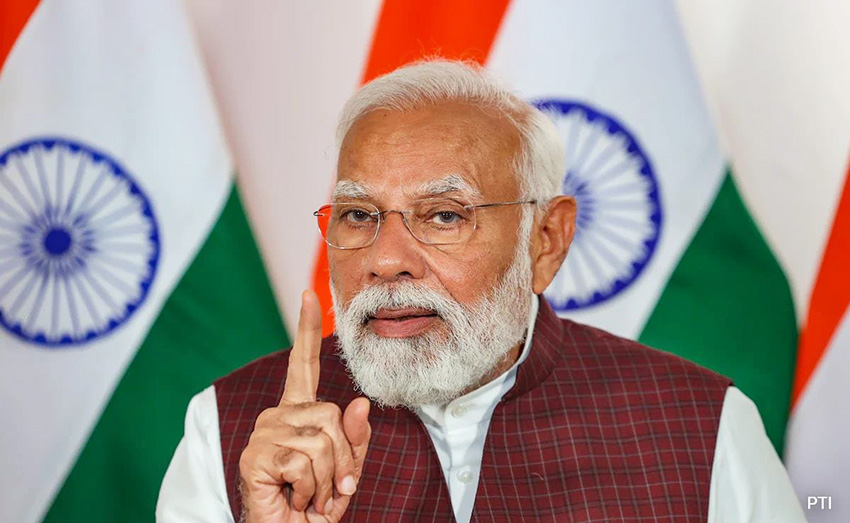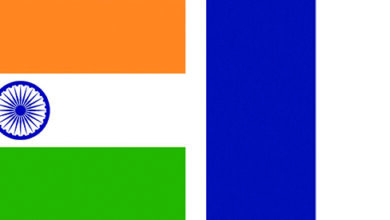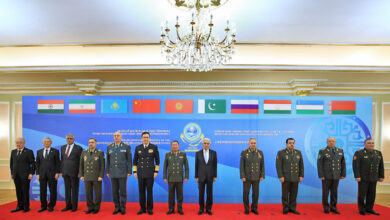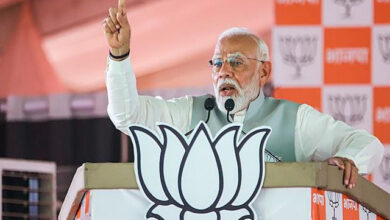India needs a government that makes the country economically stronger and more resilient in the face of global challenges: PM Modi
By R. Anil Kumar
-
‘Security of Indians staying abroad is our top priority: PM Modi
-
“Today’s era is not of war, we will get the opportunity to talk about how we can progress on the path of peace…,”: PM Modi
New Delhi, April 16. Amid rising tensions in West Asia, which were rendered far worse after Iran launched over 300 projectiles towards Israel in response to the air strike on its embassy in Syria, Prime Minister Narendra Modi has asserted that amid global hostilities and the spectre of war, the priority for the BJP-led NDA at the Centre, if elected for a third term, would be to secure the lives of fellow Indians in conflict zones.

Prime Minister Modi stressed the significance of returning to power with a brute majority, saying it would help the government navigate the global challenges and rescue trapped and distressed Indian natives from conflict zones through decisive action.
PM Modi said parts of the world were staring at a ‘war-like’ situation. “Clouds of uncertainty are hovering over the world today. Several regions are staring at a war-like situation and the world is tense and not at peace. In such times, ensuring the safety and security of our citizens becomes a priority and a paramount task for the government. Hence, the safety of our people will be the top priority for our government,” PM Modi said.
“In times when the fear of war grips the world, it is all the more necessary for a strong and stable government, with a full majority, to be elected. We should have a government that makes the country economically stronger and more resilient in the face of global challenges. It should make swift strides towards taking us to our eventual goal of a ‘Viksit Bharat’ (developed country). The BJP is determined to make this happen, if elected again. Our manifesto comes with the guarantee of such a government,” PM Modi added.
Noting the power of the tricolour in a foreign land, Prime Minister Narendra Modi said that it was the strength of the Indian flag that became his guarantee when so many people from India, as well as the youth, were trapped in Ukraine at the time of the conflict.
PM Modi said that it was the Indian tricolour that became his “guarantee” during the time of the raging war between Russia and Ukraine.
PM Modi said, “I have been very friendly with both the presidents (Russia and Ukraine). I can publicly say to President Putin that this is not the time for war. I can also say publicly to Ukraine that we should follow the path of dialogue,” underscoring that “this is because I have credibility.”
“…When I said that so many people from India our youth is trapped. And I need your help. And what can I do for you? Then I said, I have arranged so much. You help me so much. They helped. And the strength of the Indian flag was so much that even a foreigner used to hold the Indian flag in his hand. So there was a place for him. So my flag became my guarantee,” the Prime Minister emphasised.
PM Modi said that although there have been a lot of ongoing discussions about Ukraine, he has seen many such incidents since 2014.
The Prime Minister also referred to the direct call from him to the Saudi King in the year 2015, which helped India evacuate on a mass scale Indians and foreigners were stranded in war-torn Yemen when bombing by Saudi Arabia and its allies on Yemen made it difficult to evacuate Indian nationals.
The Prime Minister said, “I spoke to the Saudi King and told him that I want to bring people from Yemen there. So your bombarding is going on, we are not able to do it, How will you help us? So he said, Please try to understand me. And Sushmaji has said all these things in her interview. There used to be a period on the request of India in which there was no bombarding. And at that time, we used to take our people out in aircrafts. We brought about 5000 people from Yemen It was the same in Ukaraine.”
In March this year, PM Modi held separate telephonic conversations with Russian President Vladimir Putin and Ukraine’s President Volodymyr Zelenskyy.
Prime Minister Modi, as he dialled Russian President Putin, congratulated him for his re-election to the top office, as well as both leaders agreed to intensify efforts towards expanding the India-Russia ‘Special and Privileged Strategic Partnership’.
He reaffirmed India’s stand on dialogue and diplomacy as a way for the resolution of the conflict.
Whereas, in conversation with Zelenskyy, PM Modi had reiterated India’s people-centric approach and called for dialogue and diplomacy as the way forward in the Russia-Ukraine conflict.
The Prime Minister noted that India supports all efforts for an early and peaceful resolution of all issues between the parties. He added that India would continue to do everything within its means to support a peaceful solution.
President Zelenskyy appreciated India’s continued humanitarian assistance for the people of Ukraine. The two leaders agreed to remain in touch.
Earlier in 2022, PM Modi’s advice to President Putin over the Ukraine war during a bilateral meeting on the sidelines of the Shanghai Cooperation Organisation’s summit in Uzbekistan’s Samarkand was widely noted.
“Today’s era is not of war and I have spoken to you about it on the call. Today we will get the opportunity to talk about how we can progress on the path of peace…,” PM Modi had said.
The war between Russia and Ukraine began in February 2022.
Hisremarks assume significance when seen and interpreted in the context of the ongoing conflicts between Russia and Ukraine in Eastern Europe and the Israeli offensive against Hamas in Gaza.
Even in its second term, the BJP-led NDA demonstrated intent and action when it came to airlifting distressed Indians from conflict zones.
As the tensions between Russia and Ukraine devolved into a full-blown military conflict, an evacuation mission by the Indian government was launched to save stranded citizens in Ukraine.
The ‘Operation Ganga’ was announced on February 26, 2022, and was carried out until March 11, 2022. As part of this mission, Air Force planes as well as private flights carried out multiple sorties to bring back trapped natives from the conflict zones in Eastern Europe while providing humanitarian relief. The operation resulted in the evacuation of about 25,000 Indian nationals, as well as citizens of 18 other countries.
In a similar rescue plan, the Centre, under the leadership of PM Modi, launched ‘Operation Ajay’ to bring back stranded Indian citizens from Israel as it went to war with Hamas in response to the horrific terror attacks on October 7, last year.
According to the Ministry of External Affairs, till December, last year, 1,309 Indian citizens, 14 OCI card holders, and 20 Nepalese from Israel were rescued under ‘Operation Ajay’.
In another daring operation, an Indian Air Force’s C-130J heavy-lift aircraft rescued 121 people from a small airstrip at WadiSayyidna, which is about 40 km north of the violence-hit Sudan capital of Khartoum, in April of last year.
The airstrip had a degraded surface with no navigational aid or fuel, and, most critically, no landing lights, which are required to guide an aircraft landing at night. The pilots used night vision goggles (NVGs) to carry out the landing at night.
The mission to rescue trapped Indians from Khartoum was codenamed ‘Operation Kaveri’.
Notably, the IAF carried out similar operations to evacuate Indians from Kabul after the Taliban seized power in Afghanistan in August 2021.
Earlier, External Affairs Minister S. Jaishankar, too, weighed in on the government’s intent to bring distressed Indians in conflict zones to safety, saying, “They (world powers) note how we take care of our citizens abroad. It could be ‘Operation Ganga’ or ‘Kaveri’ or ‘Ajay’. It could be the ‘Vande Bharat’ mission during Covid (pandemic).”





